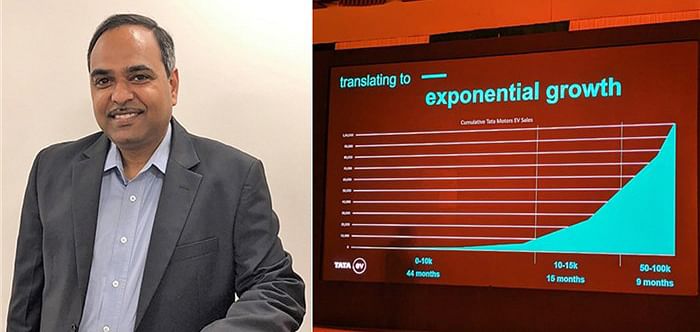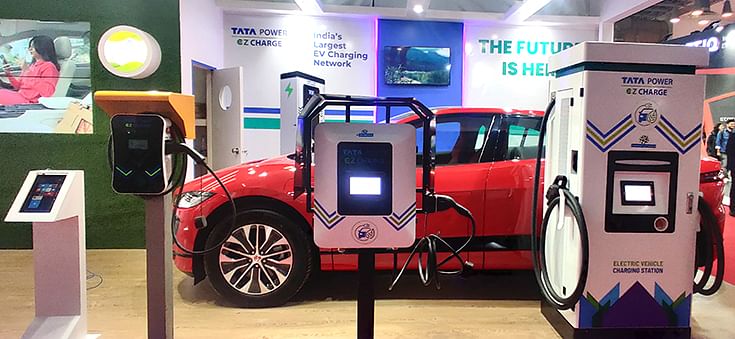'We have gained more expertise in EVs in the last five years': Shailesh Chandra
Shailesh Chandra, MD of Tata Passenger Electric Mobility, the market leader in electric passenger vehicles in India, is confident a robust charging infrastructure, new products and continued government support will drive the country towards a million EVs in the next five years.
With its over 100,000 electric cars clocking a cumulative 1.4 billion kilometres on Indian roads in the last five years, Tata Motors, which is the dominant player with over 80 percent share in India's passenger vehicle EV market, says it has become more confident about the zero-emission technology.
"While we had the know-how on EVs when we began our journey five years ago, we now feel more confident and can safely say that our knowledge has evolved into an expertise in EVs," said Shailesh Chandra, Managing Director, Tata Passenger Electric Mobility, at the company's 100,000 EV sales milestone celebration event in New Delhi, on August 11.

Three's company: Tata's existing EV portfolio comprises the Tiago EV, Nexon EV and the Tigor EV (along with the fleet-only Xpres-T sibling).
Tata Motors, which drove into the electric passenger vehicle market in India in 2018 by electrifying its Tigor compact sedan with Electra EV's 72V EV kit, later introduced the Nexon EV in January 2020 with a 350V EV architecture, christened 'Ziptron'. The Ziptron e-drivetrain has gone to power the company's three-EV portfolio, which today comprises the Nexon EV, Tigor EV and Tiago EV, while the fleet-only Xpres-T EV continues to remain powered by Electra EV's technology.
According to Tata Motors, the Nexon EV was the inflection point, and acted as a shot in the arm for its EV sales. The company believes that the Nexon EV's no-compromising product attributes with respect to its size, practicality, driving range, and price, instilled a lot of confidence in the early adopters, whose trust in the technology has been a key enabler in driving the growth of India's passenger EV segment, which today comprises 2.5 percent of the total PV market.
Government must incentivise EVs: Shailesh Chandra
While passenger vehicle EV sales in India in FY23 were pegged at 39,544 units, recording a 125 percent year-on-year uptick, the numbers compared to China, which sold 5 million EVs in 2022, is quite low.
"Despite growing from 100 to 10,000 units monthly in the last five years, EV volumes in India are still quite nascent and if we want to reach up to 30 percent EV penetration levels as China, we would need a wide range of products across all segments. The good news is that all major PV makers in India are now entering the EV segment," Chandra said.
"Moreover, deeper penetration of charging infrastructure will be critical to increase EV adoption in India, while it will also be important that the government continues to support EVs until a 20 percent penetration is achieved," he added.
 Shailesh Chandra: "We now feel more confident and can safely say that our knowledge has evolved into an expertise in electric vehicles."
Shailesh Chandra: "We now feel more confident and can safely say that our knowledge has evolved into an expertise in electric vehicles."
According to Chandra, the government – at the Centre and State – has played a very crucial role in giving a fillip to EV sales in India. Measures such as the lowest 5% GST rate on EVs, waiver of road tax, as well as various state subsidies and PLI schemes, have helped narrow the gap in prices between IC-engined models and EVs.
"The government's efforts are symbolic of their commitment towards the EV ecosystem," said Chandra.
Tata Motors, which had taken nearly four years to register the first 10,000-unit EV sales, has since then witnessed continuous improvement in EV adoption in India with the next 40,000 units sales chalked within 15 months. Growing consumer awareness of EVs as well as the gradual expansion of the country's charging infrastructure saw the company race from 50,000 to 100,000 units in a scant 9 months.
In FY2023, Tata Motors sold 47,292 units, comprising the 27,814 Nexon EVs, 16,759 Tigor EVs/Xpres-Ts and 8,358 Tiago EVs. The year-on-year growth was a strong 147% (FY2022: 19,106 units), indicating just how rapidly demand has grown for the company’s trio of EVs.

 Tata Motors' EV programme has benefitted from the company's synergies with Tata Group companies like Tata Power, which is fast expanding its charger network.
Tata Motors' EV programme has benefitted from the company's synergies with Tata Group companies like Tata Power, which is fast expanding its charger network.
Plugging into Tata Group synergies
The company says that when nobody was ready, the Tata Group ecosystem came together to spark a new segment in India. A host of Tata Group companies, including Tata Power and Tata Autocomp Systems joined forces to set up the EV infrastructure and localise EV technology, right from the battery pack, motor and various power electronics systems in India.
Tata Power along with OMCs and start-ups, has installed over 100,000 home chargers, 1,200 RWA community chargers, and 6,500 pblic chargers in the country thus far. Tata Power has recently announced plans to expand its EV charger network to over 25,000 stations by 2028.
With heightened consumer interest in the zero-emission technology, which offers ease of driving, and low total cost of ownership compared to ICE vehicles, the company believes that the market is now mature for EV products and that more product rollouts from competition will only enhance the customer's trust in the technology.
"With continued focus on charging infrastructure, more products as well as government push, I don't think anything can stop India's passenger vehicle EV market from becoming a one-million segment in the next five years," Chandra signed off on a very confident note.
ALSO READ:
EV sales in India race past 800,000 units in first 7 months of 2023
RELATED ARTICLES
Volkswagen Launches Tayron R-Line SUV in India at ₹46.99 Lakh
Volkswagen India enters the premium SUV segment with its feature-rich Tayron R-Line, offering Level 2 ADAS technology, a...
Volvo Car India and ChargeZone Open Ultra-Fast Charging Station Near Igatpuri
The jointly inaugurated 360kW charging facility near Igatpuri features two dynamic load balancing dispensers and is the ...
JSW Greentech’s 12M Electric Bus Secures CMVR Type Approval from ARAI
With this, JSW moves closer to commercial rollout of is first electric bus.






 12 Aug 2023
12 Aug 2023
 6089 Views
6089 Views





 Sarthak Mahajan
Sarthak Mahajan




